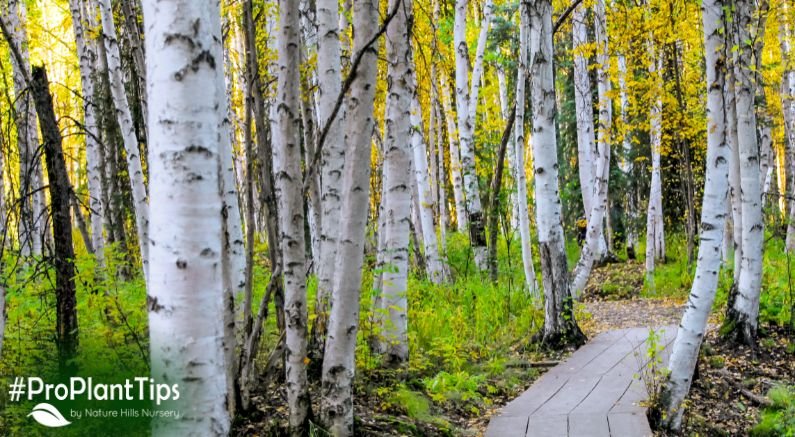Gorgeous trees with their Iconic peeling bark, finely-textured leaves, and unique features, the graceful Birch Tree is a landscape and woodland favorite!
Often displaying multiple trunks or multi-branching forms, these deciduous trees boost curb appeal anywhere they’re planted with unique catkins, fall color, and airy elegance! People in northern climates love the Birch tree’s exquisite branching, attractive foliage, and unique bark.
Delight in the pointed, feather-veined leaves from the earliest days of spring through summer. They'll bring refreshing light shade and white noise from their rustling leaves.
All About Birch Trees
One of the world's loveliest deciduous trees, Birch trees (Betula) are some of our all-time top-selling trees. You’ll find a delightful selection of Birch trees for sale at Nature Hills Nursery, with a variety to suit a number of tastes!

This celebrated tree served as ancient paper, much like an arboreal Papyrus, with manuscripts found dating back to the 1st century CE in Afghanistan. Featuring around 40 - 60 varieties around the world and belongs to the family Betulaceae.
The usual lifespan of the birch is 40-50 years. In favorable conditions, this tree can live for as long as 200 years. Birches were among the first trees to become established after the glaciers receded and can be found throughout and are still known as ‘pioneer species‘ due to their ability to grow on uncolonized land throughout North America, Europe, and Northern Asia in both tree and bush forms.
The Birch limbs and branches look great in outdoor winter décor and containers or kept as a decoration near your fireplace. These are hardwood trees and their lumber is highly valued as firewood and for furniture making.
Both male and female flowers bloom on the same tree, and the long male catkins are quite showy and are wind-pollinated and self-pollinating!
Types of Birch Trees
- River Birch
- Paper Bark Birch
- Silver Birch
- Himalayan Birch
- Gray Birch
- Sweet Birch
- Swamp Birch
- Red Birch
Birch Tree Care

These ornamental trees need full sun but a few are understory trees and handle part shade. Birch trees do well in well-drained moist soil, and their lovely form looks beautiful and reflected in the water. Birch trees are adaptable, but grow best in acidic soils. Birch can even be salt-tolerant and handle well-draining clay soil.
Forming clusters and colonies in nature, Birch is very cold-hardy down to zone 2 and up to USDA growing zones 9. Fast-growing, these trees can mature to a wide range of heights and widths.
From the little grafted Magical® Globe Birch to the large and in charge Heritage Birch, these trees are seldom damaged by deer and are a caterpillar host plant for Tiger Swallowtails, Morning Cloaks, and Common Tortoise Shell Butterflies.
Young trees do not have the exfoliating bark or the white bark (depending on the variety) until they get at least 5-plus years of age. Only then do they begin to mature, Birch then form their characteristic bark features! Nature Hills sell Birch trees already at least 3-5 years of age and will develop their key features after just a few years in your landscape!
Keep your tree well watered throughout drought conditions and mulch the site with 3-4 inches of arborist bark chips to help hold in moisture better.
Prune Birch trees in late spring to avoid the sap (like Maple trees) from leaking during the early spring and making a mess or opening the door for pests and disease.
Top 5 Birch Trees at Nature Hills

Large or small, a Birch tree or grouping of Birch adds that special touch of elegance to your landscape! Check out these fan favorites at Nature Hills!
Whitespire Birch Tree
The Whitespire (Betula populifolia 'Whitespire') is a white-barked larger and a form of the Gray Birch. Featuring improved disease and pest resistance, these are sophisticated front and backyard landscaping trees throughout USDA growing zone 3 to 7.
River Birch
Graceful cinnamon-brown peeling bark, the River Birch (Betula nigra) is cold-hardy throughout USDA growing zones 3 to 9. This buttery yellow fall color native selection is especially resistant to Bronze Birch Borer.
Royal Frost® Birch
Dark foliage and a pyramidal elegant form, with burgundy-red to plum-purple leaves, the Royal Frost® Birch (Betula x 'Royal Frost') also brings yellow/orange/red fall color to the landscape! The young dark bark matures white with age and is cold-tolerant throughout USDA growing zones 4 to 7, Royal Frost® is a standout specimen.
First Editions® Parkland Pillar® Birch
Unique columnar Birch with white bark, the Parkland Pillar® Birch (Betula platyphylla 'Jefpark'), keeps a slim profile of only 6-7 feet wide but 30-40 feet tall. The upright form and yellow fall color handle USDA growing zones 3 to 7.
Shiloh Splash River Birch Tree
Lovely white and green variegation, the Shiloh Splash (Betula nigra 'Shiloh Splash') is a River Birch with exfoliating bark and grows to a slim mid-sized reveals cinnamon, peachy-pink, tan, and creamy white bark for winter interest. Hardy throughout USDA growing zones 4 to 9.
Elegant Birch Trees at Nature Hills!
The shaggy look of the Birch tree is sophisticated, handsome, and a bit rugged. It works beautifully with all styles of architecture, from contemporary to traditional. Carefree, hardy trees, are excellent choices for year-round interest in your yard and provide airy, breezy shade for you and your family. Consider this the perfect accent in a naturalized, rustic setting.
Check out all the Birch Trees available at Nature Hills and get your own elegant specimen delivered to your doorstep! In just a few years, you’ll enjoy all the benefits and perks that members of the Betula family have to offer in your landscape today!
Happy Planting!


